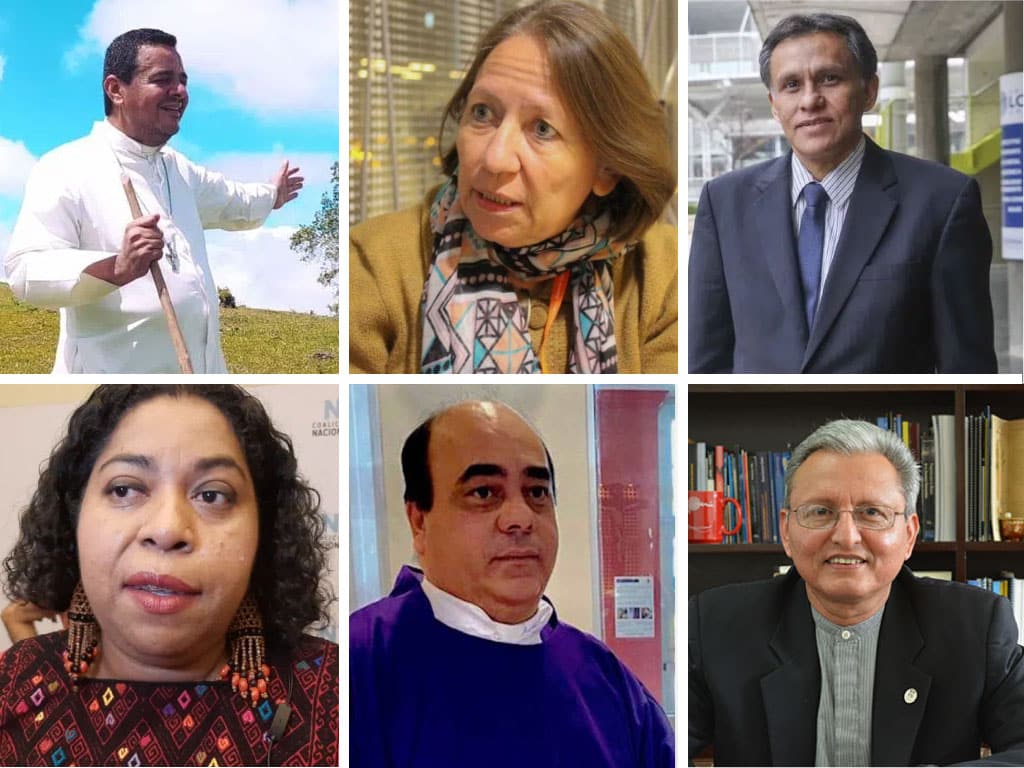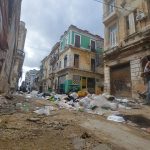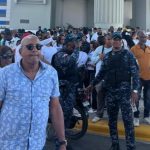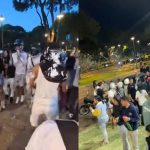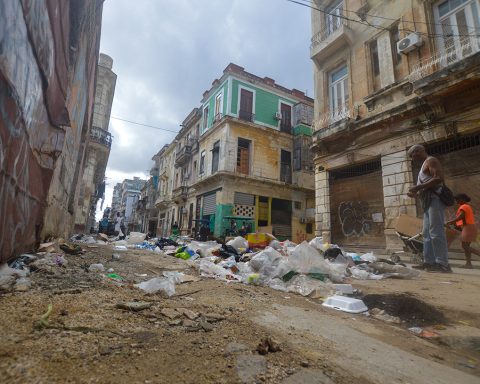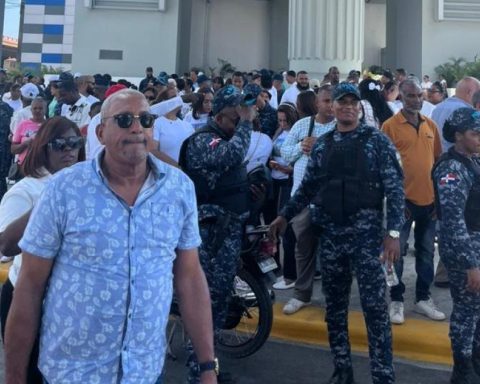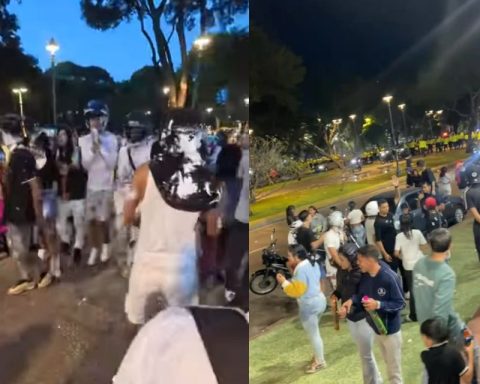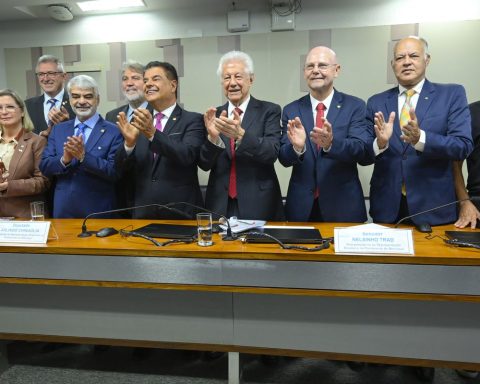William Blandonparish priest of the Santa Lucía church in Boaco, was in the city of Jerusalem, a heritage loaded with meaning for Jews, Christians and Muslims, when he was told that his mother Velia Gómez had died.
It was his second loss in a week. Blandón mourned the death of the Jesuit priest Raúl Solórzano, important in his priestly vocation, which occurred five days earlier. The third piece of bad news came when he was in Miami, Florida, ready to return to Nicaragua, and found out that he couldn’t do it.
The airline informed him on September 26 that Daniel Ortega’s regime prohibited him from returning. “I went up to Jerusalem and now those of my own country are crucifying me, denying me entry to my country. I am living the passion (of Christ) in this way. God strengthens me, he has given me a lot of peace and tranquility,” Blandón said by telephone, who denies that the priests are committing crimes in Nicaragua as the regime points out, “neither lacking sovereignty nor anything.”
For the religious, the Catholic Church, the priests in exile, or those who are forcibly confined as the Bishop of Matagalpa Rolando Alvarezthey are also living the passion of Jesus Christ, who went up to Jerusalem “to die for all the redemption of men”.
“It amazed me, it took me by surprise and it wobbled me. That change of life that I must have now. Leaving my land, my family, my people, my town, my parish, my warmth, all of that to live in a country that is not mine”, recognized the religious, who informed his bishop and is waiting for the Church decides what his destiny will be now.
According to the priest, the trip to the Holy Land was a gift from his family that has a special meaning for him, because he had to do it in 2018, on the occasion of his 25 years of priestly life, a time to meditate and reaffirm his faith. In that year, however, citizen protests broke out against the Daniel Ortega regime, then the pandemic continued and until now he was able to travel.
“Until now I was a little calmer about covid-19, because in Nicaragua we have not had peace of mind since 2018, so I decided to make my trip. So, since there are relatives here in Miami, I came here and from here I traveled to the Holy Land,” he recounted.
More than a dozen Nicaraguans exiled by Ortega and Murillo
In recent months, a dozen Nicaraguans have been victims of exile like Blandón. There are also members of civil society and the university community, such as the vice-rector of the Central American University (UCA), Jorge Huete, who was prohibited from returning after a work trip to Argentina.
The former Jesuit rector José Alberto Idiáquez He was also unable to return to Nicaragua last July, when he was in Mexico attending to health problems, because the authorities did not renew his passport.
This is retaliation, because the UCA opened its facilities to students who were persecuted by police and paramilitaries in the 2018 protests. A bill that also includes their exclusion from the National Council of Universities (CNU) and the cancellation of their percentage of 6% constitutional, with which he financed scholarships for students.
The exile of Nicaraguans by orders of Daniel Ortega and Rosario Murillo also includes intellectuals, activists and citizens in general, without any official explanation.
The feminist sociologist María Teresa Blandón received the news on the first of July last. She had just participated in a conference on population and development, of the Economic Commission for Latin America and the Caribbean (ECLAC), when she made a stopover in the capital of El Salvador. There she informed him about her new situation.
“Life is turned upside down: from looking for a place to live, for how long, in addition to indignation, there is a load of uncertainty, of not knowing how you are going to reorganize yourself,” explains Blandón, founder of the outlawed Central American program La Corriente and critic of the Ortega regime. Murillo.
The same day that María Teresa Blandón was exiled, the dictatorship did the same with the priest Juan de Dios García, vicar of the Santo Cristo de Esquipulas parish, located at the second entrance of the Las Colinas residential complex in Managua. There, at the end of May, Bishop Álvarez himself took refuge when he was besieged for five days by the Police who continued to persecute him, surrounded him in the Diocese of Matagalpa between August 4 and 19 until he stormed the curia and they locked him up the force in the residence where his parents also live, in Managua.
“A lot of energy is invested in providing you with a minimally safe space to place yourself in a new scenario; resort to support networks that not everyone has. If you have them, it probably becomes less traumatic and you reorganize your life. But, obviously, that is not what happens with the majority of people who have been forced to leave the country or who have not been allowed to enter,” added sociologist Blandón.
HRW: Nicaragua is not private property of Ortega
For Juan Pappier, senior investigator of the Americas Division of Human Rights Watch (HRW) and who has followed up on the complaints of human rights violations in Nicaragua, Ortega continues to violate the freedoms of Nicaraguans.
“Every person has a human right to return to their country of origin. It is time for Ortega to understand that Nicaragua is not his private property, but the country of Nicaraguans,” he stated through a WhatsApp message.
According to him hrw websitethe excessive concentration of power in the Executive has allowed abuses to be committed against critics with absolute impunity.
Among the exiled Nicaraguans are: Annex Alfred Cunningham, member of a UN expert mechanism on the rights of indigenous peoples; the lawyer Francisco Omar Gutiérrez, delegated as defender of the priest Leonardo Urbina, sentenced by the Ortega justice system; the doctor Joaquín Solis Piura and his wife and the writer Mario Urtecho.
Neither have Nicaraguans residing abroad been allowed to enter the country: Rosalía Miller, Felicia Medina, Tifani Roberts and Lester Alemán, the latter father of the young political prisoner of the same name.
Violent banishment of constitutional rights
Vilma Núñez de Escorcia, president of the Nicaraguan Center for Human Rights (Cenidh), maintains that the government measure violates the Political Constitution of Nicaragua, with regard to the right of citizens to mobilize in any part of the country.
Núñez affirms that the right enshrined in the international covenants on civil and political rights, instruments recognized by the State of Nicaragua such as the Universal Declaration of Human Rights, the American Declaration of the Rights and Duties of Man, the International Covenant on Human Rights, is also abused. Economic, Social and Cultural, among others, including other international instruments.
? URGENT ALERT| The Ortega Murillo regime denies the entry of Nicaraguans into their own country, he is an express violator of this right and places himself outside international law. The duty of protection of the democratic States of the world is imposed. #SOSNicaragua pic.twitter.com/n0LFNOPfWx
— Cenidh (@cenidh) September 28, 2022
The president of the Cenidh indicates that the legal situation in which each exile is left, upon knowing the decision of the State, depends on the place where they are stranded and the migratory relationship of that country with the Nicaraguans.
For example, he mentioned that if they remain in the United States —where depending on the visa they would have some mobility and the possibility of requesting refuge— or if they manage to advance to Central America where in three countries—El Salvador, Honduras and Guatemala—they can move with the identification card. Nicaraguan identity.
“You cannot say that they remain undocumented. They have not taken away their passport. They have their valid document, so their identity has not been taken away. What you have to realize is that this situation (the decision of the State) exposes them to what they are exposed to in the country where that happened to them (exile). Their case will depend on the politics of the countries where they are stranded, due to the limitless cruelty of this government,” explained Núñez.
For the human rights defender, the role of the Nicaraguan authorities at all levels is questionable, both the General Directorate of Immigration and Aliens and the Ministry of the Interior, an institution to which they attribute the measures in the notification emails sent by the airlines.
Núñez affirms that these are decisions emanating from the El Carmen neighborhood, in reference to the residence of the presidential family. Both to Father Guillermo Blandón, as well as to the feminist sociologist and the other victims of the State, the state’s decision poses the challenge of continuing with their jobs and their lives, despite the fact that they were forcibly separated from Nicaragua.
